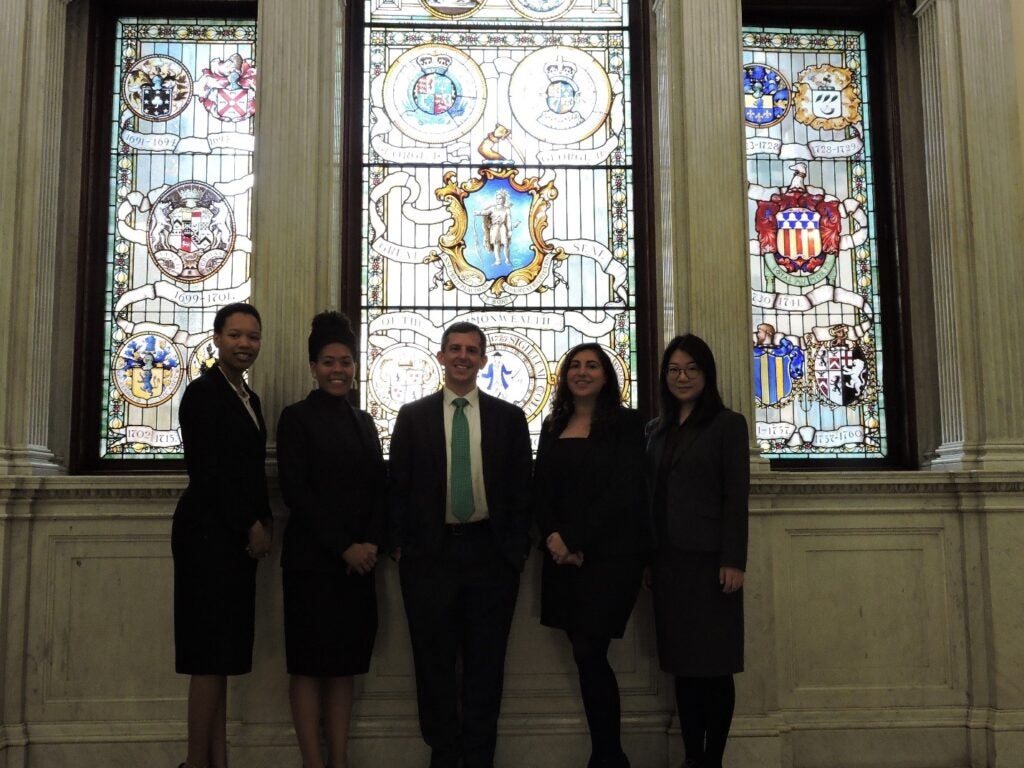By: Alexis Farmer

“Investing in a good education is something anyone can get behind,” said Breanna Williams, a 2L at Harvard Law School as she prepared her pitch to the next legislator. She was one of seven students in the Education Law and Policy Clinic/Trauma and Learning Policy Initiative who spent half of her spring semester under the gold dome of the Massachusetts Statehouse, advocating with legislators to support funding for implementation of Massachusetts’ Safe and Supportive Schools Framework statute. At the end of April, the weekly office visits and calls wind down, and only half of the group remained. Huddled in the café, Breanna, Mariah Lewis M.Ed. ’19, Pantea Faed JD ’20, and Yurui Chen JD ’20, along with Clinical Professor Michael Gregory recaped on the progress they’ve made and focus on next steps. (Other students participating in the clinic this past spring were Sarah Lu JD ’19, Sarah Mooney M.Ed. ’19, and Robyn Parkinson JD ’20.)
There is increasing acknowledgement that a significant number of children and youth in the United States undergo adversity at a young age. These experiences can have serious health and social consequences, some that can impede children from being successful in school. One study reported that two-thirds of children recounted experiencing at least one traumatic event before the age of 16. Homelessness, community violence, physical and sexual abuse, and refugee experiences are all stressful events that challenge academic, emotional and social well-being. The Safe and Supportive Schools Framework helps participating schools address these needs, through adopting trauma-sensitive practices to help all students learn and thrive in school.
In 2014, then Governor and HLS alumnus Deval Patrick signed the omnibus Act Relative to the Reduction of Gun Violence, which included the Safe and Supportive Schools law thanks to the leadership of House Speaker Robert A. De Leo. The law aims to enable schools to develop safe, inclusive, and healthy learning environments by supporting school districts to implement the Safe and Supportive Schools Framework. The law provides for trainings, technical assistance, a grant program for schools that serve as models, and on-going recommendations from a commission of experts. The clinic, which is part of a partnership between HLS and the nonprofit Massachusetts Advocates for Children, played a leading role in advocating for the law. Every year since, the clinic has advocated at the legislature to ensure that implementation of the law continues to be funded in the state budget.
Students spent the first half of the spring semester conducting thorough research on state senators and representatives before approaching them, identifying who their staff members were and the policy issues each legislator cared about. The students scouted the statehouse for each member’s office. They positioned themselves at their door with a packet of information about the bill and an elevator pitch, knowing that they had limited time to make an impression. Meetings with a legislator or their staff can be hard to secure, so most are receptive to an impromptu visit. “Most legislators are used to people showing up and being available to their constituents,” Faed remarked. Faed was able to schedule a meeting to sit down with a legislator after showing up at his door and giving her spiel. The group hasn’t encountered any partisan friction on the issue, but they do know that legislators are more likely to support the Safe and Supportive Schools line item if schools in their legislative district receive funding from the grant program. In FY19, there were 93 schools in 38 school districts that benefitted from the funding.
Students learned quickly that they had to be able to connect with legislators and their aides on the substance of the issue. They had to explain in common terms why safe and supportive school cultures are so important. Fortunately, they had spent several weeks in the beginning of the semester conducting focus groups with urban middle and high school students across Massachusetts, asking them about their educational experiences and what their schools could be doing to better support them.
“Hearing the voices of high school students first hand makes all the difference,” said Susan Cole, Director of the clinic and co-teacher with Gregory. Almost uniformly the high school students said that the most important aspects of their education were having strong, caring relationships with their teachers and feeling respected and understood by their teachers and administrators. This is at the core of what the Safe and Supportive Schools law is designed to support. “It is so much more compelling to explain the stakes of this law to legislators when you have the students’ stories fresh in your mind,” said Cole. In addition to informing their advocacy at the state house, the focus groups were also the basis of a formal report that the clinic submitted to the statewide Safe and Supportive Schools Commission in March.

In its budget recommendation, released in early April, the Massachusetts House proposed $400,000 in funding for the line item, no small success. But Rep. Ruth Balser, lead sponsor of the law and line item in the House, proposed an amendment seeking to raise the amount to $500,000 for FY 2020. That was also the amount Governor Charlie Baker recommended in his 2020 budget. In just one month, students were able to gather 78 representatives to co-sponsor the amendment.
The students’ work has the tangible achievements of securing funding for the legislation and building lasting relationships. 34 new legislators were elected this past November, giving students the opportunity to foster new partnerships and gain support that could have dividends later. “New legislators can become our greatest advocates down the line,” said Gregory. Some seasoned legislators have repeatedly backed the line item, such as Senator Sal DiDomenico, who is Assistant Majority Leader and lead sponsor of the law and line item in the Senate, and House Minority Leader Bradley H. Jones. Both are advocates of improving educational opportunities for children in Massachusetts.
When asked about what makes legislators sign on their support, Lewis said, “They buy into the theory of change. They like the idea that schools are doing things to improve their culture, and [this bill] gives them the autonomy and the tools to do it themselves.”
By the end of the semester, the students had contacted all 160 offices in the House of Representatives and all 40 offices in the Senate. Their dogged effort to gain buy-in at the statehouse helps ensure this initiative continues and provides a model for fostering a healthy school atmosphere.
“You can’t mandate school culture,” Gregory said, “but you can set the conditions to improve it. Schools can customize the work to meet the needs of their own communities. It’s an approach that appeals to a lot of people.”
While the House of Representatives did not adopt Rep. Balser’s amendment this year, the students’ advocacy paid off in the long run. Upping the amount proposed by the House, the Senate included just over $508,000 in funding for Safe and Supportive Schools in its budget – an increase from last year. A conference committee made up of members from both houses met throughout June and most of July to reconcile all of the discrepancies between their respective budgets. The committee adopted the higher amount recommended by the Senate, and Gov. Baker signed it into law at the end of July.
Filed in: Legal & Policy Work
Tags: Education Law Clinic (TLPI), Michael Gregory, Susan Cole
Contact Office of Clinical and Pro Bono Programs
Website:
hls.harvard.edu/clinics
Email:
clinical@law.harvard.edu